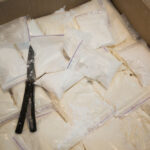The Law, Defences and Penalties for Drug Importation in Australia

Prominent Sydney horse racing figure Damion Flower has pleaded guilty in the Downing Centre District Court to charges of importing a commercial quantity of a border-controlled drug and dealing with the proceeds of crime.
The 48-year old’s pleas come just days before his jury trial was scheduled to commence, and after an ‘unexplained wealth order’ was placed on the multimillion-dollar property and horse racing empire he built up with his wife Camilla Flower.
Pleas of guilty
Both Mr Flower and his co-accused, baggage handler John Mafiti, were arrested in May 2019 after a sting at Sydney International Airport during which police seized cocaine which had been hidden in duffle bags travelling on a Qantas Flight from South Africa.
The prosecution asserted that Mr Flower collaborated with Qantas employee Mr Mafiti to import the cocaine, and that the pair had been communicating via coded text messages, using football terminology as references to the drugs.
Mr Mafiti had already pleaded guilty for his role in importing the cocaine over a three year period, as well as dealing in the proceeds of crime.
A third man, panel beater Mr Ashoor Youkhana, was sentenced to a minimum term of two years and six months in prison for acting as a delivery driver on one occasion for the operation.
Mr Flower and Mr Mafiti, who are both in custody, will be sentenced later this year.
Unexplained wealth order
Under the Criminal Assets Recovery Act 1990, the New South Wales Crime Commission can make an application to the Supreme Court for an unexplained wealth order.
The Supreme Court must make an unexplained wealth order if the Court finds that there is a reasonable suspicion that the person against whom the order is sought has, at any time before the making of the application for the order:
- Engaged in a serious crime related activity or serious crime related activities ; or
- Acquired serious crime derived property from any serious crime related activity of another person, whether or not the person against whom the order is made knew or suspected that the property was derived from illegal activities.
The Supreme Court can refuse to make an unexplained wealth order if it thinks it is in the public interest to do so.
Shares in racehorses as well as homes and property in NSW, Queensland and Victoria, more than $1 million in cash, cars, a speed boat have been seized, according to Supreme Court documents.
Damion Flower’s wife, Camilla Flower and her company Millsy Enterprises have also had an unexplained wealth order made against them. Mrs Flower has not been charged with any criminal offences.
The offence of drug importation in Australia
Drug importation is an offence under sections 307.1 (commercial quantity), 307.2 (marketable quantity) and 307.3 (any quantity) of the Criminal Code Act 1995.
To be found guilty of the offence, the prosecution must prove beyond a reasonable doubt that:
- You imported a substance,
- The substance was a border controlled substance, and
- You knew the substance was a border controlled substance, or were reckless as to whether or not it was a border controlled substance.
The term ‘import’ includes to bring the substance into Australia, as well as to deal with the substance in connection with its importation.
The term ‘reckless’ means you foresaw there was a substantial risk the substance was a border controlled plant but went ahead with your actions regardless.
If the prosecution wishes to charge you with importing a marketable or commercial quantity of drugs, it will need to prove the existence of that quantity.
The relevant quantity for the purpose of drug importation offences is the pure quantity of the drugs.
So, for example, if the charges related to 1 kilogram of cocaine at a purity of 45%, the relevant weight for the purpose of the charge is 450 grams.
This is different to state offences such as drug supply, where the entire weight of the substance – known as the ‘admixture’ – is relevant.
| Offence | Quantity |
| Importing a commercial quantity of drugs (Section 307.1) | · Ecstasy: 500 grams
· Amphetamines: 750 grams · Heroin: 1.5 kilograms · Cocaine: 2 kilograms · Cannabis: 100 kilograms |
| Importing a marketable quantity of drugs (Section 307.2) | · Ecstasy: 0.5 grams
· Amphetamines, heroin and cocaine: 2 grams · Cannabis: 25 kilograms
|
| Importing any quantity of drugs (Section 307.3) | The prosecution does not need to prove a particular quantity; it will be enough to import any quantity of drugs. |
The maximum penalties that apply to drug importation charges, as well as the penalties actually imposed, are reflected in the following table:
| Offence | Quantity | Maximum Penalty | Median penalty |
| Importing a commercial quantity of drugs (Section 307.1) | · Ecstasy: 500 grams
· Amphetamines:750 grams · Heroin: 1.5 kilograms · Cocaine: 2 kilograms · Cannabis: 100 kilograms |
Life imprisonment | Imprisonment (92%), with full term of 8 years and non-parole period of 6 years. |
| Importing a marketable quantity of drugs (Section 307.2) | · Ecstasy: 0.5 grams
· Amphetamines, heroin and cocaine: 2 grams · Cannabis: 25 kilograms
|
25 years imprisonment | Imprisonment (99%), with full term of 6 years and non-parole period of 4 years. |
| Importing any quantity of drugs (Section 307.3) | The prosecution does not need to prove a particular quantity; it will be enough to import any quantity of drugs. | 10 years imprisonment | Imprisonment (62%), with full term of 18 months and non-parole period of 12 months. |
Legal defences
In addition to having to prove the elements (or ingredients) essential to drug importation – including that you were the person responsible (identity) and that you were aware or reckless to the fact you were importing a border controlled drug (knowledge), the prosecution must also disprove beyond a reasonable doubt any legal defences you may raise.
The most common legal defence is duress, which is where you committed the offence because you were threatened that you, or someone close to you, would be seriously harmed.
Other available, but less common, defences include self-defence, necessity and mental illness.
Charged with drug importation?
If you or a loved-one is charged with drug importation, call Sydney Criminal Lawyers® today on (02) 9261 8881 for advice and representation from a specialist criminal defence team that is vastly experienced in defending serious drug cases.
Have a look through our recent criminal law cases for examples of commercial drug importation cases we have won, as well as the difficult circumstances in which we have achieved bail for clients in high-profile, large commercial drug cases.
Receive all of our articles weekly
Related Articles
RELATED LEGISLATION
- Section 307.1 Criminal Code Act 1995 | Importing or Exporting A Commercial Quantity of Border Controlled Drugs
- Section 307.2 Criminal Code Act 1995 | Importing or Exporting a Marketable Quantity of Border Controlled Drugs
- Section 307.3 Criminal Code Act 1995 | Importing or Exporting Border Controlled Drugs








